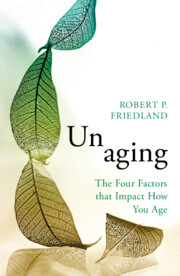Book contents
- Unaging
- Reviews
- Unaging
- Copyright page
- Dedication
- Contents
- List of Figures and Tables
- Preface
- Part I Foundations: What Do We Need to Know about Optimal Aging?
- Part II Applications: What Can We Do about the Opportunity of Aging?
- 12 Overview
- 13 Physical Activity
- 14 Whole Body Health
- 15 Mental Activity
- 16 Psychological Measures
- 17 Social Factors
- 18 Dealing with Stress
- 19 Sleep
- 20 Diet
- 21 Microbial Considerations
- 22 Dental Care
- 23 Dealing with Doctors and Drugs
- 24 Hazardous Behaviors
- 25 Toxic Exposures
- Part III Conclusions
- Acknowledgments
- Glossary
- References
- Index
14 - Whole Body Health
from Part II - Applications: What Can We Do about the Opportunity of Aging?
Published online by Cambridge University Press: 15 September 2022
- Unaging
- Reviews
- Unaging
- Copyright page
- Dedication
- Contents
- List of Figures and Tables
- Preface
- Part I Foundations: What Do We Need to Know about Optimal Aging?
- Part II Applications: What Can We Do about the Opportunity of Aging?
- 12 Overview
- 13 Physical Activity
- 14 Whole Body Health
- 15 Mental Activity
- 16 Psychological Measures
- 17 Social Factors
- 18 Dealing with Stress
- 19 Sleep
- 20 Diet
- 21 Microbial Considerations
- 22 Dental Care
- 23 Dealing with Doctors and Drugs
- 24 Hazardous Behaviors
- 25 Toxic Exposures
- Part III Conclusions
- Acknowledgments
- Glossary
- References
- Index
Summary
A critical component of the theory of the multiple reserves is that the health of the body is good for the health of the brain. The brain is dependent on all other body parts for maintenance of its functions. This dependence upon other bodily functions is especially prominent in older persons, because of their lower reserve capacities. Research has shown that intensive blood pressure control is more effective than standard blood pressure control in reducing the risk of cognitive impairment. It is certainly true that "what is good for the heart is good for the brain.” It is valuable to have the best possible heart, lung, kidney, liver, and endocrine function. Diabetes increases the risk of Alzheimer’s disease as well as small and large strokes. Avoidance of obesity and physical exercise can lower the risk of diabetes. A high-fiber diet can improve insulin responsiveness and diminish the severity of diabetes. The recommendations in this book are good for the health of the heart, lungs and other organs as well as directly beneficial to the nervous system. Good systemic health means good physical reserve. Good physical reserve helps to maintain healthy brain function throughout life.
- Type
- Chapter
- Information
- UnagingThe Four Factors that Impact How You Age, pp. 198 - 199Publisher: Cambridge University PressPrint publication year: 2022



